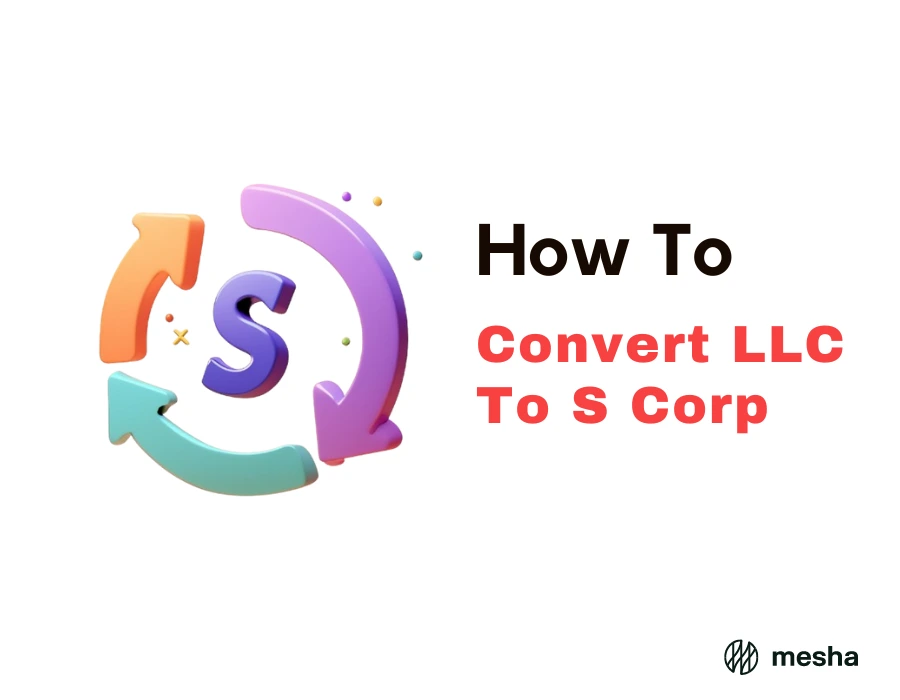5 Steps to Convert LLC to S Corp

Navigating the world of business structures can be complex. Especially when considering a change, like an LLC to S Corp conversion.
This article aims to simplify that process. We’ll provide a step-by-step guide on how to convert your LLC to an S Corp.
We’ll delve into the tax consequences, advantages, and disadvantages of such a conversion.
Whether you’re an entrepreneur, a small business owner, or just exploring your options, this guide is for you.
By the end, you’ll have a clearer understanding of whether this conversion aligns with your business goals.
Table of Contents
Understanding LLC and S Corp Structures
Before diving into the conversion process, it’s crucial to understand what LLCs and S Corps are.
An LLC, or Limited Liability Company, is a business structure that provides its owners, known as members, with personal liability protection. This means that members are not personally responsible for the company’s debts and liabilities.
On the other hand, an S Corporation, or S Corp, is a corporation that elects to pass corporate income, losses, deductions, and credits through to their shareholders for federal tax purposes. This allows S Corps to avoid double taxation on the corporate income.
Understanding these differences is the first step in deciding whether a conversion is right for your business.
Also Read: How to file an S Corp tax extension.
Why Convert Your LLC to an S Corp?
There are several reasons why an LLC might consider converting to an S Corp. The primary reason is often related to potential tax benefits.
As an S Corp, you can potentially save on self-employment taxes. This is because an S Corp allows owners to be treated as employees and to draw a salary, which can result in lower Social Security and Medicare taxes.
Here are a few reasons why you might consider converting:
- Potential tax savings
- More structure in business operations
- Increased credibility with potential investors and partners
- Ability to issue stock and attract investors
Remember, every business is unique, and what works for one might not work for another. It’s important to consider your business’s specific needs and circumstances before making a decision.

Advantages and Disadvantages of Converting LLC To S Corp
Before you decide to convert your LLC to an S Corp, it’s crucial to weigh the advantages and disadvantages. This will help you make an informed decision that aligns with your business goals.
Here are some advantages of converting to an S Corp:
- Potential tax savings: As mentioned earlier, S Corps can offer tax benefits. Owners can draw a salary and potentially save on self-employment taxes.
- More structure: S Corps have a formal structure, with directors and officers. This can provide more organization and clarity in business operations.
- Increased credibility: Being an S Corp can enhance your business’s credibility with potential investors, partners, and customers.
However, there are also disadvantages to consider:
- More paperwork: S Corps require more paperwork and formalities, such as annual reports and director meetings.
- Restrictions on shareholders: S Corps have restrictions on the number and type of shareholders they can have.
- Potential for increased scrutiny from the IRS: Because of the potential tax benefits, S Corps may face more scrutiny from the IRS.
It’s important to consider these factors and consult with a tax professional or attorney before making a decision. They can provide guidance based on your specific situation and goals.
Step 1: Check Eligibility for S Corp Status
The first step in converting your LLC to an S Corp is to check if your business is eligible. Not all businesses can become S Corps. The IRS has specific requirements that must be met.
Your business must be a domestic corporation with only allowable shareholders. These can include individuals, certain trusts, and estates. It cannot have more than 100 shareholders. Furthermore, it can only have one class of stock. Non-resident aliens cannot be shareholders. If your business meets these requirements, you can proceed with the conversion process. If not, you may need to explore other options.
Step 2: Understand the Tax Consequences
Before you convert your LLC to an S Corp, it’s crucial to understand the tax implications. S Corps are pass-through entities, meaning the corporation itself is not subject to federal income tax. Instead, the shareholders report the corporation’s income or losses on their personal tax returns.
However, S Corp shareholders who provide services to the corporation are considered employees. They must receive reasonable compensation, which is subject to employment tax. The remaining income, distributed as dividends, is not subject to self-employment tax. This can result in significant tax savings, but it’s important to consult with a tax professional to fully understand the potential impact on your tax liability.
Step 3: File IRS Form 2553 for S Corp Election
Once you’ve decided to convert your LLC to an S Corp, the next step is to file IRS Form 2553. This form is used to elect your corporation’s status as an S Corp for tax purposes. It’s important to file this form within two months and 15 days of the beginning of the tax year in which the election is to take effect.
Keep in mind that all shareholders must sign Form 2553. It’s crucial to ensure that the form is filled out correctly and submitted on time to avoid any potential issues with the IRS.
Step 4: Comply with State-Level Requirements
After filing IRS Form 2553, you’ll need to comply with any state-level requirements. These requirements can vary widely from state to state. Some states may require you to file a separate form to elect S Corp status at the state level.
It’s important to research and understand the specific requirements in your state. You may need to consult with a tax professional or attorney to ensure you’re meeting all necessary state-level requirements for your S Corp conversion.
Step 5: Adjust Your Business Operations
Once you’ve successfully converted your LLC to an S Corp, you’ll need to adjust your business operations accordingly. This includes meeting the “reasonable salary” requirement for S Corp shareholders. This means that shareholders who provide services to the corporation must receive a reasonable compensation for their services.
Additionally, you’ll need to adjust how you handle profit distribution and taxation. Unlike an LLC, an S Corp must distribute profits and losses to shareholders in proportion to their share ownership. This can have significant implications for your business’s financial management.
Maintaining S Corp Status and Compliance
Maintaining your S Corp status requires adherence to certain corporate formalities. This includes keeping detailed records and minutes of shareholder meetings. It’s also crucial to maintain a separate business bank account for the S Corp and to handle the allocation of income and losses among shareholders properly.
Moreover, you’ll need to stay on top of your tax reporting obligations. This includes accurate and timely filing of your S Corp’s tax returns. Remember, the IRS scrutinizes S Corp elections closely, so it’s essential to ensure full compliance to avoid potential issues.
Questions about converting an LLC to S Corp
Can I convert LLC to to S Corp: Advantages and Disadvantages
Converting an LLC to an S Corporation can offer several advantages and disadvantages. One major benefit is the potential for tax savings; S Corps allow profits and losses to pass through to shareholders’ personal tax returns, avoiding double taxation. This can be particularly advantageous for small businesses seeking to optimize their tax strategy. Additionally, S Corps can provide credibility and attract investors who might prefer the corporate structure. However, there are drawbacks, including increased administrative requirements and costs associated with maintaining corporate formalities, such as issuing stock, holding regular board meetings, and keeping detailed records. Furthermore, S Corps have limitations on the number and type of shareholders they can have, which might not suit all businesses. Therefore, careful consideration and possibly consulting with a financial advisor or attorney is advisable before making the switch.
Conclusion: Is Converting to an S Corp Right for You?
Deciding to convert your LLC to an S Corp is a significant decision. It requires careful consideration of various factors, including tax implications, operational changes, and compliance requirements. It’s also important to assess whether the conversion aligns with your personal financial goals and the long-term strategic plans for your business.
Remember, every business is unique, and what works for one might not work for another. Therefore, it’s crucial to consult with a tax professional or attorney to understand the full impact of the conversion. This will help you make an informed decision that best suits your business needs.


